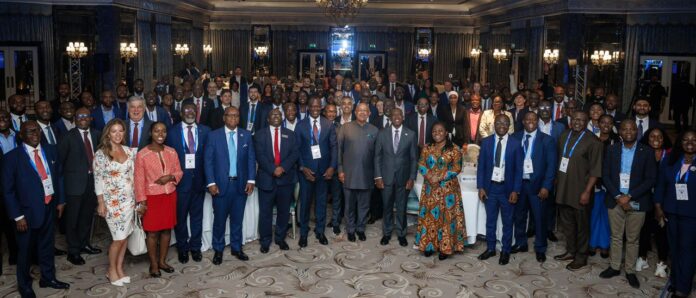At the Ghana International Bank convergence in London, financial experts have outlined ambitious plans for transforming Africa’s commodity and trade finance sector.
Dean Adansi spearheads the value-addition initiative, with Lord Boateng, Governor Buah Saidy, and senior central bank officials joining industry leaders for three days of high-level discussions in London from August 6-8.
It brought together policymakers, financiers, commodity executives, legal experts, and development specialists from across Africa and the global market.
Discussions covered various aspects, including the development of actionable strategies aimed at transitioning the continent from reliance on raw commodities to value-added trade, backed by sustainable finance and integrated infrastructure.
Under the theme ‘Rethinking Commodity Finance for Growth’, the conference examined the opportunities and structural reforms necessary to expedite Africa’s industrialisation, enhance its trade standing, and unlock new revenue streams.
GHIB Chief Executive Officer Dean Adansi advocated for a reconfiguration of Africa’s commodity export model.
He pointed out that 14% of Africa’s exports consist of value-added goods, a statistic that has remained stagnant for decades, representing a significant loss of potential earnings worth billions in unrealised export revenues.
“We are missing out on billions in export income because we continue to export raw cocoa instead of chocolate, raw gold instead of refined bullion, and raw cashew instead of processed kernels,” Mr. Adansi informed the attendees.
“The financing solutions are available, but they require alignment among banks, policymakers, and industry.”
He suggested establishing dedicated value-addition funds, expanding structured trade finance for processing facilities, and encouraging risk-sharing agreements between African and international lenders.
He also called for regulatory harmonisation across African economies to facilitate the free movement of processed goods under the African Continental Free Trade Area (AfCFTA).
A keynote session titled ‘Growing Africa through Commodities’ featured Governor Buah Saidy of the Central Bank of The Gambia, who provided a candid evaluation of the strategic importance of commodities in maintaining macroeconomic stability.
“For too long, Africa’s commodity wealth has been exported in its rawest form, resulting in lost value and jobs abroad,” Governor Saidy stated.
Saidy added: “By investing in domestic refining capabilities, developing regional value chains, and securing fairer trade terms, we can stabilise our currencies, bolster reserves, and foster lasting resilience in our economies.”
Representing Ghana’s central bank, First Deputy Governor Dr. Zakaria Mumuni emphasised the Bank of Ghana’s dedication to enhancing domestic gold refining capacity and incorporating ESG considerations into commodity sector policies.
He noted that refining at the source could decrease Ghana’s reliance on imported refined bullion and serve as a safeguard against global market volatility.
“Ghana’s long-term macroeconomic stability hinges on our capacity to derive more value from the commodities we produce,” asserted the First Deputy Governor of the Bank of Ghana.
“Boosting our domestic gold refining capacity is not merely about increasing export revenues; it’s about fortifying our reserves, improving our trade balance, and ensuring that Ghanaians benefit more directly from the resources we possess.”
In a keynote address on the second day, Lord Paul Boateng, a former UK Cabinet Minister and GHIB Board Member, contended that Africa must regard its commodity resources as geopolitical assets.
“Critical minerals, cocoa, gold — these are not just entries in a trade ledger,” Lord Boateng remarked.
“They are bargaining chips in a shifting global landscape, and Africa must leverage them to secure technology transfers, infrastructure investments, and sustainable value chains.”
His comments set the stage for a panel discussion on the competition for critical minerals, a sector expected to thrive due to increasing global demand for battery metals and clean energy inputs.
Panellists examined the policy frameworks and financing models necessary to ensure Africa transitions from extraction to refining and high-value manufacturing, particularly within electric vehicle supply chains.
Panel highlights Breadth, depth, and solutions.
Day 3 of the event featured numerous panels and fireside chats that delved into the commodity finance landscape from various angles.
Commodity trade as a catalyst for economic renewal:
Speakers analysed Africa’s current commodity profile and identified financing gaps that hinder the development of processing industries.
Case studies showcased cocoa and cashew processing as early adopters in value addition.
New methods of commodity financing – The cocoa case study:
This discussion used Ghana’s cocoa sector as a framework to explore how hybrid financing models and forward contracts can be structured to support smallholder farmers and processors.
Minerals and petroleum finance:
Executives from the mining, energy, and banking sectors debated how to create competitive financing packages for large-scale extractive projects while incorporating local content requirements.
AI and blockchain in commodity finance:
Technology leaders showcased practical applications for digital ledgers in trade documentation, fraud reduction, and tracking goods in transit.
Success factors in commodity finance:
This session brought together bankers and trade finance specialists to analyse the elements that contribute to successful commodity finance deals, from credit risk.




